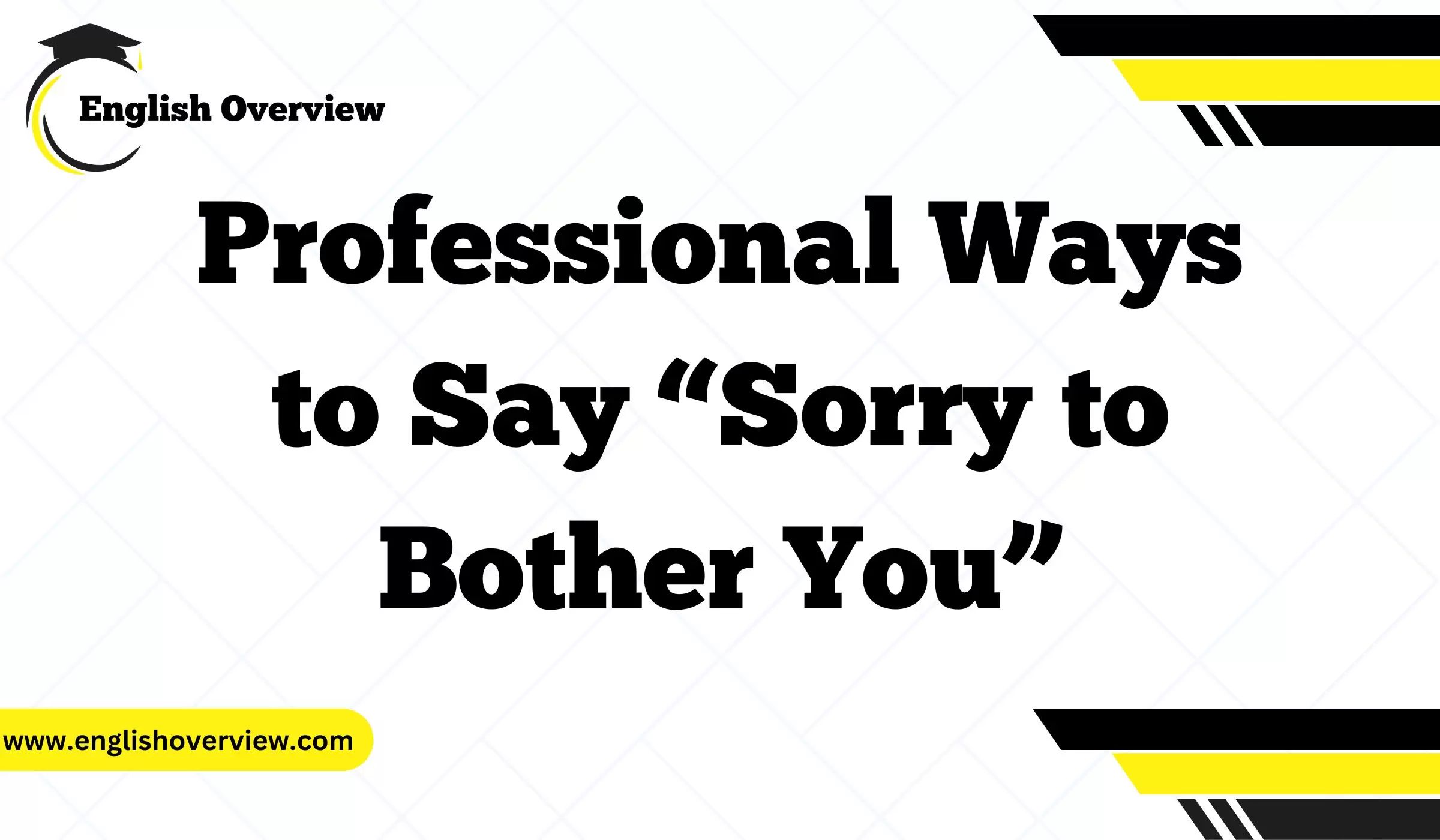In the fast-paced world of professional communication, knowing how to apologize for an interruption is a valuable skill. It’s essential to convey respect for the recipient’s time while addressing your inquiry.
Here are 20 professional ways to express your apologies and minimize any inconvenience:
List of Professional Ways to Say “Sorry to Bother You”
- I apologize for interrupting your busy schedule.
- My sincere apologies for taking up your time.
- I hope this message isn’t an inconvenience.
- I apologize if my message is disrupting your day.
- I’m sorry to disturb you with this inquiry.
- Please forgive the interruption, but I have a question.
- My apologies for reaching out unexpectedly.
- I’m mindful of your time, but I have a quick question.
- I hope I’m not disturbing you with this message.
- Please excuse the interruption; I have a matter to discuss.
- My apologies for any inconvenience my message may cause.
- I’m sorry to disrupt your day with this inquiry.
- I apologize for any disturbance caused by my message.
- I understand your time is valuable; I’ll be brief.
- My sincere apologies for the unscheduled message.
- I hope I’m not inconveniencing you with this communication.
- Please forgive the interruption, but I have a quick request.
- I’m sorry for any disruption caused by my outreach.
- I apologize for the unexpected nature of my message.
- I hope I’m not bothering you with this brief message.
1. I apologize for reaching out
Sometimes, the simplest apologies are the most effective. This phrase acknowledges the intrusion without unnecessary embellishments.
Scenario: Subject: Quick Query on Upcoming Project Dear David,
I hope this email finds you well. I apologize for reaching out unexpectedly, but I have a quick question regarding the upcoming project timeline. Your insights would be greatly appreciated.
Best regards, Charles
Additional Tip: Consider mentioning the urgency or importance of your request to emphasize the need for a swift response.
2. I know you’re busy, and I’m sorry
This apology combines acknowledgment of the recipient’s busy schedule with a straightforward expression of regret.
Scenario: Subject: Time-Sensitive Matter Dear David,
I know you’re busy, and I’m sorry for adding to your workload. However, there’s a time-sensitive matter related to the client presentation that requires your attention. Your guidance would be invaluable.
Best, Charles
Additional Tip: Offer flexibility in your request by suggesting alternative times for discussion.
3. I hope I’m not interrupting
Expressing concern about interrupting shows respect for the recipient’s current activities.
Scenario: Subject: Brief Query on Budget Allocations Dear David,
I hope this email finds you in the midst of a productive day. I hope I’m not interrupting, but I have a brief query regarding budget allocations for the upcoming quarter. Your expertise is crucial in finalizing our financial strategy.
Best regards, Charles
Additional Tip: Include a sentence assuring them that a quick response is all you need.
4. I hope this doesn’t inconvenience you
This phrase emphasizes your awareness of the recipient’s potential inconvenience, demonstrating consideration for their time.
Scenario: Subject: Request for Feedback Dear David,
I hope this email doesn’t inconvenience you, but I’m seeking your feedback on the latest project proposal. Your insights will undoubtedly enhance the quality of our submission.
Best, Charles
Additional Tip: Express gratitude for their time and input to reinforce the value of their contribution.
5. I hope this doesn’t come at an inconvenient time
Similar to the previous apology, this one explicitly addresses the timing of your communication.
Scenario: Subject: Quick Discussion on Team Dynamics Dear David,
I hope this email doesn’t come at an inconvenient time. I was hoping to have a quick discussion regarding recent developments in our team dynamics. Your perspective would be invaluable.
Best regards, Charles
Additional Tip: Provide a brief context for your inquiry to help them understand the urgency.
6. Sorry to burden you with this
This phrase conveys a sense of shared responsibility and acknowledges that your request may impose on their time.
Scenario: Subject: Assistance Needed on Project Evaluation Dear David,
I hope you’re well. Sorry to burden you with this, but I could use your assistance in evaluating the progress of our ongoing project. Your expertise is crucial in ensuring its success.
Best, Charles
Additional Tip: Clearly outline the specific ways in which their input will contribute to the resolution of the matter.
7. I apologize for the repeated request
If you find yourself revisiting a topic, this apology acknowledges the repetition and seeks understanding.
Scenario: Subject: Follow-Up on Proposal Feedback Dear David,
I apologize for the repeated request, but I’m following up on the feedback for the recent proposal. Your input is highly valued, and I appreciate your time.
Best regards, Charles
Additional Tip: Briefly mention any adjustments made based on previous feedback to show responsiveness.
8. Sorry to bring this up again
Similar to the previous apology, this phrase recognizes the recurrence of the matter at hand.
Scenario: Subject: Second Round of Budget Discussions Dear David,
Sorry to bring this up again, but as we delve deeper into budget discussions, your insights would greatly influence our decisions. Your time and expertise are truly appreciated.
Best, Charles
Additional Tip: Offer a concise summary of the progress made since the last discussion to provide context.
9. I appreciate your busy schedule, but
This apology expresses gratitude for the recipient’s time while introducing your request.
Scenario: Subject: Opportunity for Collaboration Dear David,
I appreciate your busy schedule, but I couldn’t pass up the opportunity to discuss a potential collaboration that aligns with our mutual interests. Your insights would be invaluable.
Best regards, Charles
Additional Tip: Clearly outline the benefits or positive outcomes of their involvement to increase their motivation to respond.
Read More: Ways to Say “Thank You for Your Attention” in an Email
10. Give me a few days to learn more
If your inquiry requires additional research on your end, this phrase communicates your commitment to providing a well-informed request.
Scenario: Subject: Research for Upcoming Presentation Dear David,
I hope this message finds you well. Before delving into our discussion next week, would it be possible to give me a few days to learn more about the topics we’ll be covering? Your patience is truly appreciated.
Best, Charles
Additional Tip: Briefly mention the specific areas or questions you aim to address during your research.
11. I hope I’m not disturbing you with this message
This apology communicates your awareness of potential disturbance and seeks to minimize any inconvenience caused.
Scenario: Subject: Clarification on Project Requirements Dear David,
I hope I’m not disturbing you with this message, but I have a few questions regarding the recent changes in project requirements. Your clarification would be immensely helpful in ensuring our team is on the right track.
Best regards, Charles
Additional Tip: Briefly explain the impact of their input on the project’s success to underscore its importance.
12. Please excuse the interruption; I have a matter to discuss
This phrase combines politeness with acknowledgment of the interruption, framing your inquiry as a matter of importance.
Scenario: Subject: Urgent Matter Requiring Your Input Dear David,
Please excuse the interruption; I have a matter to discuss that requires your expertise. Your insights will play a crucial role in resolving this issue promptly.
Best, Charles
Additional Tip: If applicable, highlight any potential positive outcomes or solutions that may result from their input.
13. My apologies for any inconvenience my message may cause
Expressing regret for potential inconvenience demonstrates consideration for the recipient’s situation.
Scenario: Subject: Request for Approval on Revised Timeline Dear David,
My apologies for any inconvenience my message may cause, but I need your approval on the revised project timeline. Your quick response is highly appreciated.
Best regards, Charles
Additional Tip: If applicable, mention any steps you’ve taken to minimize the impact of your request on their time.
14. I’m sorry to disrupt your day with this inquiry
Acknowledging the potential disruption to their day conveys empathy and emphasizes the importance of their time.
Scenario: Subject: Time-Sensitive Client Inquiry Dear David,
I’m sorry to disrupt your day with this inquiry, but we have a time-sensitive client request that requires your attention. Your prompt assistance will help us meet the client’s expectations.
Best, Charles
Additional Tip: Clearly outline the urgency of the situation to convey the importance of their timely response.
15. I apologize for any disturbance caused by my message
This apology recognizes the possibility of disturbance and expresses regret for any inconvenience caused.
Scenario: Subject: Quick Follow-Up on Meeting Action Items Dear David,
I apologize for any disturbance caused by my message, but I wanted to follow up on the action items from our recent meeting. Your updates are crucial for the team’s progress.
Best regards, Charles
Additional Tip: Briefly mention the progress made or challenges faced since the last communication to provide context.
16. I understand your time is valuable; I’ll be brief
Acknowledging the value of their time and promising brevity can make your request more palatable.
Scenario: Subject: Brief Update on Project Milestones Dear David,
I understand your time is valuable, so I’ll be brief. I wanted to provide a quick update on the project milestones and get your input on the next steps.
Best, Charles
Additional Tip: Summarize key points in bullet points or a concise format to enhance clarity and brevity.
17. My sincere apologies for the unscheduled message
Expressing sincere apologies for an unscheduled message conveys a sense of regret for any disruption caused.
Scenario: Subject: Unscheduled Meeting Request Dear David,
My sincere apologies for the unscheduled message, but I was hoping to discuss a matter that requires your attention. Your guidance will be instrumental in our decision-making process.
Best regards, Charles
Additional Tip: Clearly state the purpose of the discussion to help them understand the importance of their involvement.
18. I hope I’m not inconveniencing you with this communication
This phrase emphasizes your concern for potential inconvenience, reinforcing your commitment to respecting their time.
Scenario: Subject: Request for Additional Resources Dear David,
I hope I’m not inconveniencing you with this communication, but we are in need of additional resources for the upcoming project phase. Your support in securing these resources would be highly appreciated.
Best, Charles
Additional Tip: Clearly outline the benefits or positive outcomes that may result from their assistance.
19. Please forgive the interruption; I have a quick request
Combining a polite request for forgiveness with an acknowledgment of interruption can soften the impact of your inquiry.
Scenario: Subject: Quick Approval Needed for Marketing Campaign Dear David,
Please forgive the interruption; I have a quick request. We need your approval for the upcoming marketing campaign, and your insights will be crucial for its success.
Best regards, Charles
Additional Tip: If applicable, highlight any potential positive outcomes or benefits of their approval.
20. I’m sorry to disturb you with this inquiry
A classic yet effective apology, expressing regret for disturbance while seeking their input.
Scenario: Subject: Urgent Client Inquiry Dear David,
I’m sorry to disturb you with this inquiry, but we have an urgent client matter that requires your immediate attention. Your expertise will help us address this issue promptly.
Best, Charles
Additional Tip: If applicable, include a brief summary of the issue to provide context and urgency.
Pros and Cons of Different Apologies (Continued)
Pros:
Empathy: Demonstrating empathy for potential inconvenience enhances the sincerity of your apology.
- Politeness: Using polite language can create a positive tone and improve the overall impression of your communication.
- Clarity: Clearly stating the purpose of your message helps the recipient understand the importance of their involvement.
Cons:
Subjective Perception: The effectiveness of apologies can vary based on the recipient’s personality and preferences.
- Overemphasis on Apology: While apologies are essential, overemphasizing them may divert attention from the main purpose of your message.
- Consistency: Ensure consistency between your apology and the nature of your request to avoid confusion or misinterpretation.

Ethan Richards is currently an English instructor at a university. She has experience in teaching and assessing English tests including TOEFL, IELTS, BULATS, FCE, CAE, and PTEG. With over a decade of teaching expertise, Ethan Richards utilizes his knowledge to develop English lessons for her audience on English Overview.


















